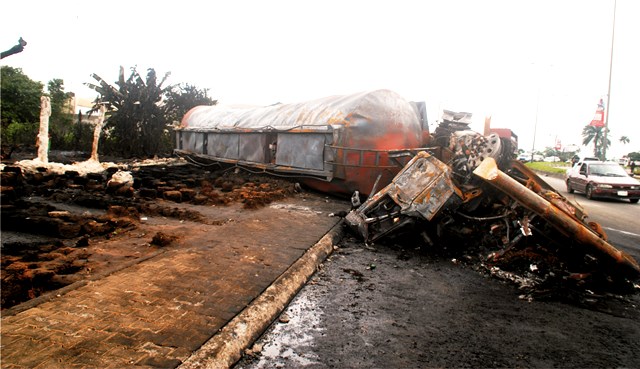Business
Firms Clash Over Nigerian Crude Oil

Oil major BP has clashed with rival, Vitol in the Nigerian crude market, buying up cargoes and taking a big derivative position that may have raised costs for European refiners, according to Reuters.
New trading opportunities arose from August, when broker Sunrise started the first derivative for Nigeria’s four largest crude oil grades – Bonny Light, Forcados, Qua Iboe and Bonga – mirroring derivatives trading in the North Sea.
The derivatives, known as contracts for differences (CFDs), allow traders to bet on whether premiums of the four Nigerian grades versus the Brent benchmark will rise or fall.
The CFDs, also known as swaps, can be used to hedge against price fluctuations during the voyage of a physical cargo to a consumer, which can take weeks. But CFDs can also be used to take a speculative position.
According to five traders familiar with the developments, who asked not to be named because they are not allowed to speak to the media, BP quietly built a long position of up to 10 million barrels in the African CFDs contracts in August, betting the premium of the grades to Brent will rise in September.
Against BP in the paper market were six trading desks, including trading giant Vitol, which took the opposite side of the bet and went short CFDs, betting that African grades’ premiums to Brent would fall, according to trading sources.
The paper deals were done on a back-to-back basis with only BP, Vitol and five other companies aware of the developments.
BP said it does not comment on trading positions. “However, BP welcomes the introduction of the new West African swap to provide greater transparency and aid price discovery in the West African crude market,” it said on Friday.
The trades took place in what has long been a regulatory gray area. London’s Financial Conduct Authority, which does not regulate London trading in the West African crude market, but does oversee the UK Brent crude benchmark, declined to comment.
BP does not produce oil in Nigeria and has not been a large trader of Nigerian oil in recent years, although it has bought some cargoes for its refining system.
After quietly building its paper position in August, BP launched a flurry of bids on the Platts system in September for physical cargoes of Nigerian oil.
BP bid for a total of 22 Nigerian cargoes loading between Sept 3-12, a previously unseen volume in the West African crude market, where a whole month can sometimes go without a single public bid or offer in the Platts window.
BP’s bidding activity ushered premiums of the African grades against the Brent benchmark to as high as $1.70 per barrel compared to a premium of $1.20 a barrel in August, when BP was building its CFDs position.
A difference of 50 cents per barrel would in theory bring a profit of $5 million on a 10-million-barrel CFD position.
The rise in premiums in the physical market made BP a big winner on its long position on the CFDs trade, while Vitol was a loser, according to traders.
Transport
Nigeria Rates 7th For Visa Application To France —–Schengen Visa

Transport
West Zone Aviation: Adibade Olaleye Sets For NANTA President

Business
Sugar Tax ‘ll Threaten Manufacturing Sector, Says CPPE

In a statement, the Chief Executive Officer, CPPE, Muda Yusuf, said while public health concerns such as diabetes and cardiovascular diseases deserve attention, imposing an additional sugar-specific tax was economically risky and poorly suited to Nigeria’s current realities of high inflation, weak consumer purchasing power and rising production costs.
According to him, manufacturers in the non-alcoholic beverage segment are already facing heavy fiscal and cost pressures.
“The proposition of a sugar-specific tax is misplaced, economically risky, and weakly supported by empirical evidence, especially when viewed against Nigeria’s prevailing structural and macroeconomic realities.
The CPPE boss noted that retail prices of many non-alcoholic beverages have risen by about 50 per cent over the past two years, even without the introduction of new taxes, further squeezing consumers.
Yusuf further expressed reservation on the effectiveness of sugar taxes in addressing the root causes of non-communicable diseases in Nigeria.
-

 Niger Delta3 days ago
Niger Delta3 days agoPDP Declares Edo Airline’s Plan As Misplaced Priority
-

 Sports3 days ago
Sports3 days agoSimba open Nwabali talks
-

 Nation3 days ago
Nation3 days agoHoS Hails Fubara Over Provision of Accommodation for Permanent Secretaries
-

 News4 days ago
News4 days agoDon Lauds RSG, NECA On Job Fair
-
Niger Delta3 days ago
Stakeholders Task INC Aspirants On Dev … As ELECO Promises Transparent, Credible Polls
-
Niger Delta3 days ago
Students Protest Non-indigene Appointment As Rector in C’River
-

 Oil & Energy3 days ago
Oil & Energy3 days agoNUPRC Unveils Three-pillar Transformative Vision, Pledges Efficiency, Partnership
-
Rivers3 days ago
Fubara Restates Continued Support For NYSC In Rivers

